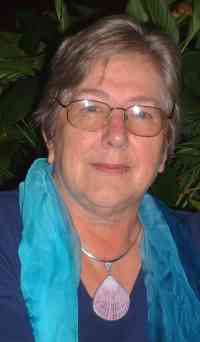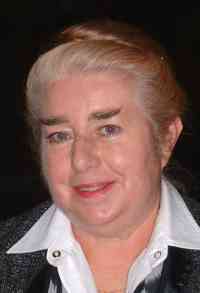 Like many women, Jill Paton Walsh began to write when she found herself stuck at home with a small baby. She was one of those intensely verbal people for whom "nothing is more boring than a baby before it's learned to talk", so she set out to entertain herself by writing a book which would appeal to the girls she had recently been teaching. She did not write for the bookish child she had been herself, but for 3B, her class of early developing, easily distracted girls. She knew that they liked plenty of action and bloodshed, and that they would not tolerate more than four lines of description at a time, so she wrote Hengest's Tale, which - rather to her relief - is now out of print.
Like many women, Jill Paton Walsh began to write when she found herself stuck at home with a small baby. She was one of those intensely verbal people for whom "nothing is more boring than a baby before it's learned to talk", so she set out to entertain herself by writing a book which would appeal to the girls she had recently been teaching. She did not write for the bookish child she had been herself, but for 3B, her class of early developing, easily distracted girls. She knew that they liked plenty of action and bloodshed, and that they would not tolerate more than four lines of description at a time, so she wrote Hengest's Tale, which - rather to her relief - is now out of print.
Hengest's Tale was successful enough to encourage her to continue, and her next book was The Dolphin Crossing, born of a desire to write about the war for children who did not remember it, and were inclined to romanticise it. Her own earliest memories came from her very early childhood in wartime London: she spoke vividly about being woken by a bomb falling on the house opposite and, feeling cold, getting up to close the window. But the window of her bedroom was missing, sucked out by the after-effect of the blast. Peering up over the window sill, she could just see out, and there below was her window, with barely a pane broken. Beside it on the ground, several large dolls lay in disarray. Only later did she realise what she had actually seen: as a child she was not disturbed by a sight she did not comprehend, and returned to bed. Later, when she learned from newsreel footage of the Dunkirk evacuation that a few boys in their early teens had been permitted to take part in that exercise, her memories of a child's perception of wartime helped her to shape her story. Jill Paton Walsh is critical of The Dolphin Crossing, and aware of its flaws, but pleased that the book spoke to its intended audience, and says that in all her career, the thing of which she is proudest is her collection of letters from dyslexic boys who tell her that it is the first book they have ever read all the way through!
Despite now writing only for adults, she claims that "Writing for children is more important than anything I'm doing now, and I would still be doing it if it hadn't left me." She spoke generously of today's highly successful children's authors, particularly those authors whose books appeal to all ages. Although such "crossover" successes are regarded as a modern phenomenon, it is in fact the "breach in the audience", the division of books into adult and children's lists, that is modern: the ultimate audience is an entire tribe listening to a story. She, and others of her generation, had tried to write so well that adults would also read their books. She felt they had failed, although many of her audience seemed to disagree. They had not, however, had the commercial success of a J.K. Rowling or a Philip Pullman, who had succeeded in crossing the gap between children and adults by using fantasy. Jill Paton Walsh was not dismissive of fantasy, saying that she enjoys reading fantasy although she tends not to write it: "I have written fantasy; I found it many times harder than writing realistically."
 Although she did not say so, of her own books the one which best draws together all these strands is Knowledge of Angels: set on an imaginary island in a non-historical past, it is both a distillation of her studies "in a sense, that's the book I was born to write, because it drew on things I already knew," and a reaction to contemporary events:"It's about Salman Rushdie also - it's about being a heretic.". Her publisher turned it down because "up to page 38, it read like a children's book", and so did the eighteen other British publishers to whom she submitted it. Eventually, having sold the book for US publication with no effort at all, she and her partner John Rowe Townsend decided to publish it themselves. In one sense it was hugely successful, selling worldwide, gaining glowing reviews, shortlisted for the 1994 Booker prize and finding a home, among other places, the A-level syllabus.
Although she did not say so, of her own books the one which best draws together all these strands is Knowledge of Angels: set on an imaginary island in a non-historical past, it is both a distillation of her studies "in a sense, that's the book I was born to write, because it drew on things I already knew," and a reaction to contemporary events:"It's about Salman Rushdie also - it's about being a heretic.". Her publisher turned it down because "up to page 38, it read like a children's book", and so did the eighteen other British publishers to whom she submitted it. Eventually, having sold the book for US publication with no effort at all, she and her partner John Rowe Townsend decided to publish it themselves. In one sense it was hugely successful, selling worldwide, gaining glowing reviews, shortlisted for the 1994 Booker prize and finding a home, among other places, the A-level syllabus.
While Knowledge of Angels was in the doldrums, Jill's agent suggested that she might try something different - ie turn to crime. What had seemed like a dead end opened up new possibilities: she set about writing the Imogen Quy mysteries, classic detective stories of the kind that are referred to in the States as "cosies", featuring not a hard-boiled female private eye but a traditional womanly college nurse. And it was because of Imogen Quy that she was approached by the Sayers Estate. Initially they asked simply for a professional opinion: was it possible to construct a novel on the basis of the manuscript abandoned by Dorothy L. Sayers?: eminent crime-writer P.D. James was of the opinion that it was not. Jill Paton Walsh was of the opinion that it could be done. Only after securing this response did the Sayers Estate ask her, in that case, to do it. She hesitated - it takes courage to venture where P.D. James fears to tread - but succumbed to the temptation. Thrones, Dominations pleased many Sayers devotees who might have been expected to resist interference with their beloved Peter Wimsey, and was well reviewed, by (among others) P.D. James. It revived the sales of the canonical Wimsey novels to the degree that she was asked to repeat the experiment, this time without even a plot outline, but drawing on a series of letters which Miss Sayers had written during the war, supposedly exchanged by members of the Wimsey family. She likened this to having a chess board before her, and being given the positions of the pieces, but having the freedom to play the game as she would. A Presumption of Death also brought her back to the subject of life in England during the war. This exhausted the surviving Sayers material - any further Lord Peter novels (and she did not rule them out) will be pure Jill Paton Walsh.
 For the length of an evening, we were that ultimate audience, a tribe gathered together while a storyteller held us enthralled with stories. Fortunately we had Margaret Lewis to keep us grounded. She brought to the task not only good-humour and perceptive questions, but a wealth of relevant experience: she is an expert on crime fiction, the author of Ngaio Marsh: A Life (the authorised biography of crime writer Ngaio Marsh) and Edith Pargeter: Ellis Peters, a book about the life and work of this popular writer. At the end of 2001 she took part in a radio programme on women crime writers devised by Marcel Berlins for Radio Four. She is an active member of the Crime Writers' Association and a member of the Society of Authors. With her husband, Peter Lewis, she runs a small publishing company, Flambard Press, from her home in Northumberland.
For the length of an evening, we were that ultimate audience, a tribe gathered together while a storyteller held us enthralled with stories. Fortunately we had Margaret Lewis to keep us grounded. She brought to the task not only good-humour and perceptive questions, but a wealth of relevant experience: she is an expert on crime fiction, the author of Ngaio Marsh: A Life (the authorised biography of crime writer Ngaio Marsh) and Edith Pargeter: Ellis Peters, a book about the life and work of this popular writer. At the end of 2001 she took part in a radio programme on women crime writers devised by Marcel Berlins for Radio Four. She is an active member of the Crime Writers' Association and a member of the Society of Authors. With her husband, Peter Lewis, she runs a small publishing company, Flambard Press, from her home in Northumberland.

This website is maintained by Cornwell Internet
as part of their sponsorship of the Literature Festival
Last update: 11th October 2004



